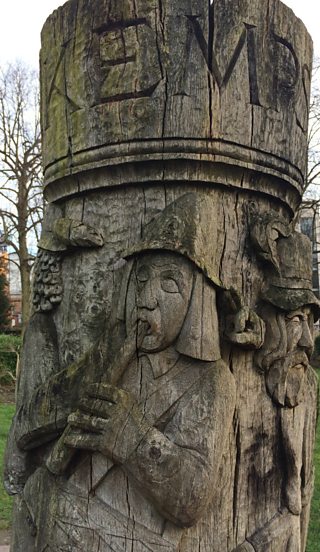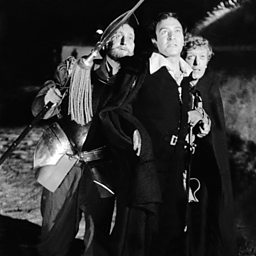Was this where Shakespeare got the idea for Hamlet?
It is arguably William Shakespeare's greatest work. Certainly the line 'to be or not to be...' uttered by the tortured Prince of Denmark has made Hamlet one of the best known plays written by the Bard.
We can only guess where the playwright found inspiration for the plot. There's no evidence to suggest that Shakespeare had been to Denmark, yet the play is rich in detail about the country's castle-life. So where did he get his information?
The answer could involve William Kempe, the actor who played the fool in many of Shakespeare's comedies. A clue from a forgotten Elizabethan manuscript lays a tantalising trail from Shakespeare to Denmark. SALLY-BETH MacLEAN from the Records of Early English Drama takes up the story.

Researching Elizabethan theatre history in the archives has its unexpected moments when new discoveries are made. My own favourite came when I was searching for evidence of entertainment in the historic county of Surrey before 1642.
I read through uncatalogued and hastily written...accounts looking for the key words that make a researcher’s eyes light up – player, music, dance – without any luck
The family of John Evelyn, the famous diarist and horticulturalist, was based at Wotton near Guildford but their papers were not there nor in any Surrey record office. Instead a 20th century descendant had deposited them in his former college, Christ Church Oxford, where my chase led me.
The archives office at Christ Church at the time was not in the splendid Georgian library but in a much less grand building where I was given a small table to work at surrounded by the college archives on shelves nearby.
For a couple of chilly days I read through uncatalogued and hastily written Evelyn household accounts looking for the key words that make a researcher’s eyes light up – player, music, dance – without any luck.
Watching the Detectives
For more than 35 years, the academics and historians from the Records of Early English Drama project have been pouring over echoes from the past helping to build an accurate picture of the life and legacy of William Shakespeare. Like any investigation, they follow a trail of clues - using a wealth of knowledge and sometimes modern day forensics - to help fill in the gaps of our understanding of the Bard.
It was a world before mass media and smartphones, even widespread printing was in its infancy, so often they're left with nothing more than dusty fragments - forgotten accounts, logs and letters - resurrecting voices which have been silent for hundreds of years.
Their meticulous analysis makes us eye-witnesses to the movements and achievements of our national playwright, filling in the significant blanks of what we know about William Shakespeare. And like any investigation, there are breakthroughs.

John Evelyn’s father was a practical man, more interested in recording items relating to his gunpowder business or the cost of black stockings he purchased. And then the archivist brought me a very different manuscript, unbound but obviously more formally written (and easier to read as a bonus).

It soon became obvious that this had belonged to a very different household as there were frequent references to ‘my lord’ – but who? When the name ‘Killingworth’ (or Kenilworth) surfaced I had an important clue and then the discovery of the lord’s patronage of players emerged, starting in May 1585, with the name of a famous Shakespearean clown, Will Kempe, ‘one of the pleyers.’
Even more remarkably, the manuscript revealed travel to the continent – both players and patron went to the Low Countries.
The entry that really made me put my pencil down and let out an inward shout (no noise is welcome in the archives) was this one, slightly modernized: ‘Paid to mr Richard Brown…which he gave to your Lordship players at Arnhem at their going to the king of Denmark’s the same day…’
Shakespeare on Tour
From the moment they were written through to the present day, Shakespeare’s plays have continued to enthral and inspire audiences. They’ve been performed in venues big and small – including inns, private houses and emerging provincial theatres.

BBC English Regions is building a digital picture which tracks some of the many iconic moments across the country as we follow the ‘explosion’ in the performance of The Bard’s plays, from his own lifetime to recent times.
Drawing on fascinating new research from Records of Early English Drama (REED), plus the British Library's extensive collection of playbills, as well as expertise from De Montfort University and the Arts and Humanities Research Council, Shakespeare on Tour is a unique timeline of iconic moments of those performances, starting with his own troupe of actors, to highlights from more recent times. Listen out for stories on Shakespeare’s legacy on your BBC Local Radio station from Monday 21 March, 2016.
You never know - you might find evidence of Shakespeare’s footsteps close to home…
Craig Henderson, BBC English Regions
What I had stumbled across was a hitherto unknown manuscript from the household of Robert Dudley, earl of Leicester, kept by Sir Richard Browne, the grandfather of John Evelyn’s father-in-law.

Here was evidence of Leicester’s players (including Will Kempe, Thomas Pope and George Bryan) touring to the continent, what's now known as the Netherlands, as part of their patron’s lavish retinue when he was made governor of the Low Countries – and striking out on their own to the royal court at Elsinore - the eventual setting for Shakespeare's Hamlet.
All three players were to move on to form the core of Lord Strange’s acting troupe after Leicester’s death in 1588. They were stars at the Rose Theatre in London and at court in the early 1590s, and then joined Shakespeare in the Lord Chamberlain’s company in 1594. Did they share their tales of Elsinore with him?
A eureka moment for sure!

From the experts:
-
![]()
Was Shakespeare a genius?
Where did the term 'bardolatry' come from?
-
![]()
The first lady of Shakespeare
Sarah Siddons helped legitimise the role of female performers
-
![]()
The actor who overcame prejudice to win over audiences
Ira Aldridge toured extensively during the 19th Century



